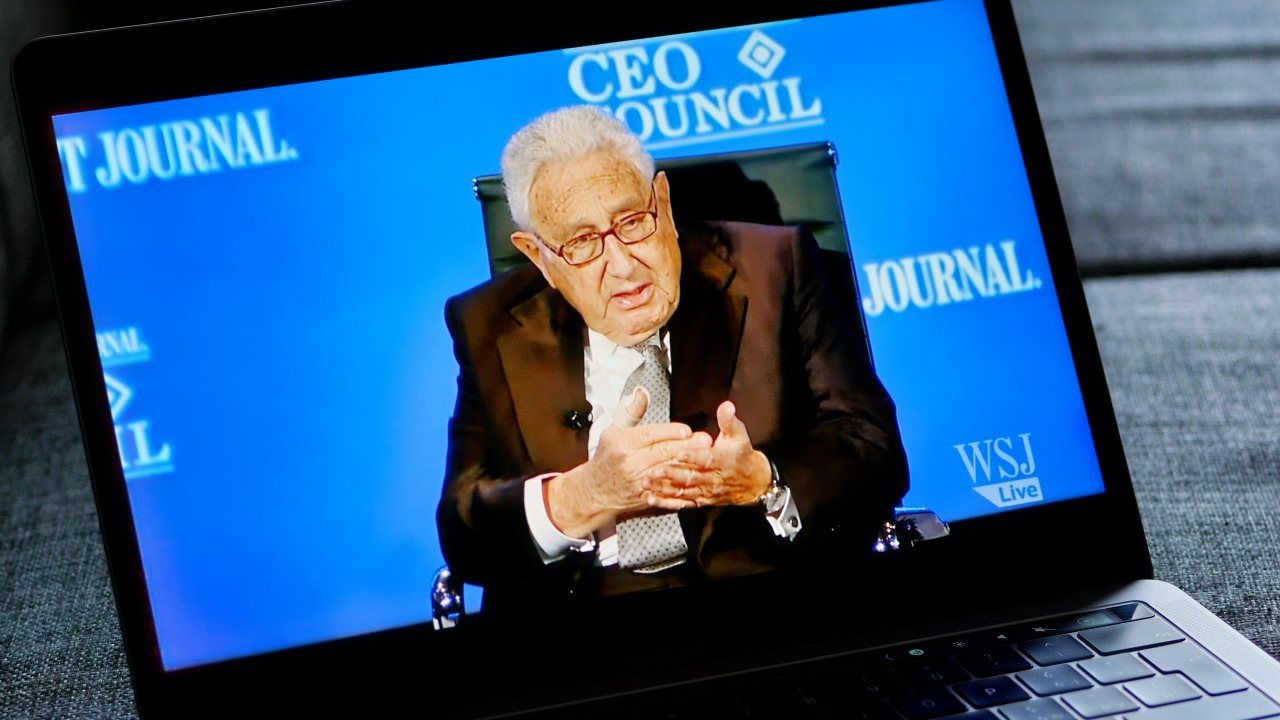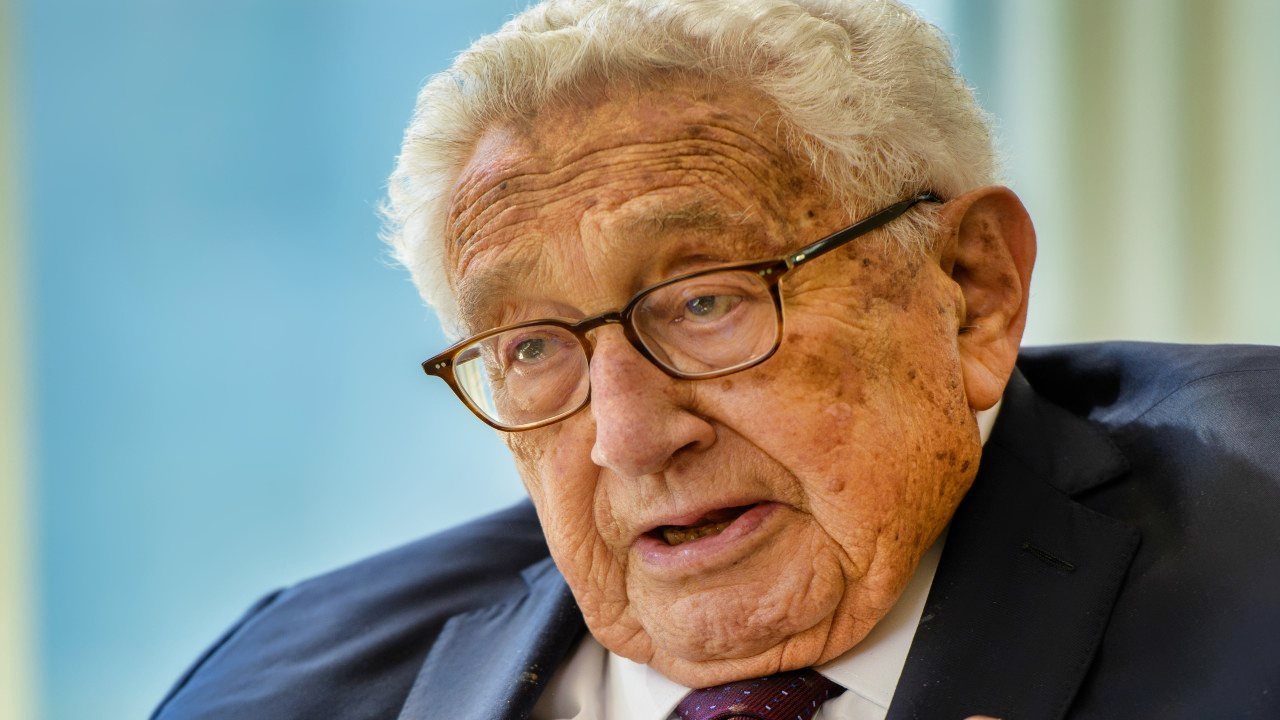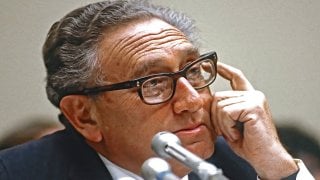Graham Allison: How Henry Kissinger Shaped My Life
I entered Henry Kissinger’s classroom at Harvard University 58 years ago, in 1965. Indeed, I have been learning from him ever since.
When Henry Kissinger reached the 100-year marker last Spring, I was fortunate to be able to join with his many friends and admirers in celebrating his birthday and thank him personally for more than I can express in words. In short, he has been a formative force in my life.
About the many contributions of America’s greatest living statesman to America’s peace and security, the historical record speaks for itself. My remembrance will focus on my personal experience with him as a great teacher and mentor to me, as he was to so many other students and assistants over the generations who have tried to follow in his footsteps. At a recent event in which I was interviewing Henry, the host introduced him as the longest-serving and suffering continuing-education professor in Harvard’s 387-year history—and me as his student. While this may have been meant to suggest that I was a slow learner, I took it as a compliment.

How I Learned from Henry Kissinger over the Decades
I entered Henry’s classroom at Harvard 58 years ago, in 1965. Indeed, I have been learning from him ever since. In the past several years, I’ve had the good fortune to continue meeting or Zooming with him every several weeks. I’ve never come away from one of these sessions without several pages of notes, new insights, and questions that require further thought. In recent decades, I was proud that Henry often introduced me not simply as his student but as a colleague and even as a friend. For me, he has not only been a seminal teacher and mentor, but a personal inspiration.
In one of the highlights of this past January’s World Economic Forum meeting in Davos, I was asked to interview Henry about his historical perspective on the current war in Ukraine and the risks of war between the United States and China. In noting that he was rapidly approaching the 100th year of his birth, I thanked him for enlarging our conception of a meaningful life. He was a living demonstration that it is possible for a human being to remain intellectually engaged and productive well beyond the conventional Biblical “three score and ten.” He gave the rest of us hope. When someone in the audience observed that the century of Henry’s life covers 40 percent of the history of the United States of America, I reminded them that this was less a reflection of how old Henry was than of how young the United States is.
Henry Kissinger was America’s greatest living statesman, Harvard’s most accomplished living graduate, and the model practitioner of statecraft as Applied History. pic.twitter.com/RNfDkQVc8g
— Graham Allison (@GrahamTAllison) November 30, 2023
Over these 247 years, the United States has been blessed to have many great leaders serve as presidents, warriors, and diplomats. But when we ask which of these leaders in statecraft and diplomacy will be studied by students at Harvard 50 years from now, or indeed in 2123, one can be certain that this list will include Henry Kissinger. As another great American statesman, Colin Powell, noted at the celebration of Henry’s 90th birthday: “Unlike the rest of us political appointees, before Henry was a statesman, he was a scholar.”
In 1965, as a first-year graduate student who had just returned to Harvard from two years at Oxford, I enrolled in Government 180: “Principles of International Relations.” This was one of the legendary courses at Harvard that had previously been taught by McGeorge Bundy until he left Cambridge in 1961 to become John F. Kennedy’s National Security Advisor. Henry’s version of the course was grounded in history, which he analyzed to introduce me and his other students to the world of diplomacy, strategy, and statecraft. From the Congress of Vienna (about which Kissinger had written his first book, A World Restored) to Bismarck’s diplomacy in creating the modern state of Germany, the rivalry between a rising Germany and Great Britain that ended in the “Great War” of 1914, the locust years in the intermission between World War I and World War II, the horrors of Nazism and fascism in the 1930s and 40s, to the Cold War, nuclear weapons, and Vietnam—these were topics about which Kissinger delivered two brilliant lectures a week and assigned several hundred pages of mind-stretching weekly reading. Fortunately, I performed well enough in the course to be asked by Professor Kissinger to become his course assistant the following year and the year after that—not only for his basic course but for his graduate Defense Policy Seminar as well. Soon, I found myself also serving as an occasional research assistant, helping him gather and assess material on topics he was writing or consulting for Washington.
Kissinger and Realism
Many commentators have celebrated—and criticized—Kissinger as a master practitioner of realpolitik, which, of course, he was.

But for Henry, the much more important lesson he attempted to teach about statecraft was the moral idealism of realism. For him, realism was not just about the advancement of one state’s interests. The larger purpose is the construction of a viable order to prevent catastrophic war. Having experienced the horrors of Nazism and a war in which more than 50 million souls had perished, Kissinger’s imperative was peace.
For insights about how that could be achieved, Henry taught us that the primary source is history. Indeed, when my colleague Niall Ferguson and I revived the Applied History initiative at Harvard a decade ago and published its “Applied History Manifesto,” we identified Henry as the exemplary “statesman as applied historian.” As Henry’s most formative history teacher described his protégé, Henry was “musically attuned to history…as a gift from God.” As Henry has explained: “History is not a cookbook offering pretested recipes. It teaches by analogy, not by maxims. History illuminates the consequences of actions in comparable situations.” But as Professor Kissinger taught: “each generation must discover for itself what situations are in fact comparable.”
When, to his shock and surprise, in 1968, President-elect Richard Nixon asked him to become National Security Advisor, Henry moved from his seat in the world of scholarship to the central arena where he had the opportunity to practice what he had preached. While I was tempted to join his staff at the NSC, I had just recently become an assistant professor and was hoping to grow up to become a professor at Harvard. Nonetheless, he gave me opportunities to consult with members of his NSC staff on issues where they thought I could be helpful. This included work with another Harvard professor Henry had taken with him to Washington, Mort Halperin.
Among the central challenges of the period were nuclear weapons and the risk of nuclear war. Having published the major study on the Cuban Missile Crisis, I was sometimes able to offer insights from the experience of President Kennedy and his colleagues in that most dangerous crisis in recorded history as they contemplated choices that Kennedy believed had a one-in-three chance of ending in nuclear catastrophe that would cause the deaths of hundreds of millions of human lives. From Kissinger and Nixon’s recognition that the consequences of a full-scale nuclear war could completely destroy the US, they developed a concept of a relationship with the Soviet Union they labeled “detente.” This did not deny the fundamental rivalry between the United States and the Soviet Union but found ways to constrain it to keep it from stumbling into a hot war.
Kissinger and Nuclear Weapons
Over his entire professional career, Henry wrestled with the challenge posed by nuclear weapons. The fact that he never came to a settled conclusion is a vivid reminder of his intellectual courage and unwillingness to accept easy answers. In his first book on the topic, Nuclear Weapons and Foreign Policy, he advocated “limited nuclear war,” but eventually rejected the idea as further analysis clarified the risk that what began as a limited war would escalate to full-scale nuclear war. By the time he entered the White House in 1969, he had come to the view that “there could be no higher duty than to prevent the catastrophe of nuclear war.” Four decades later, as President Obama took office, Henry joined George Shultz, Sam Nunn, and Bill Perry in recommending that the U.S. President embrace the objective of a “world free of nuclear weapons” and urged an “agenda of urgent steps towards that goal.”
In 2013, when I pressed him on the question about what he would have recommended to the President if he knew the United States was under nuclear attack, he responded: “I have no answer”—noting that this had been the question that “tormented” him most when he was National Security Advisor and Secretary of State.
In 2013, I pressed Henry Kissinger on what he would have recommended to the President if he knew the United States was under nuclear attack. He responded: “I have no answer,” noting that this had been the question that “tormented” him most in government. pic.twitter.com/AANI8WEpsh
— Graham Allison (@GrahamTAllison) November 30, 2023

